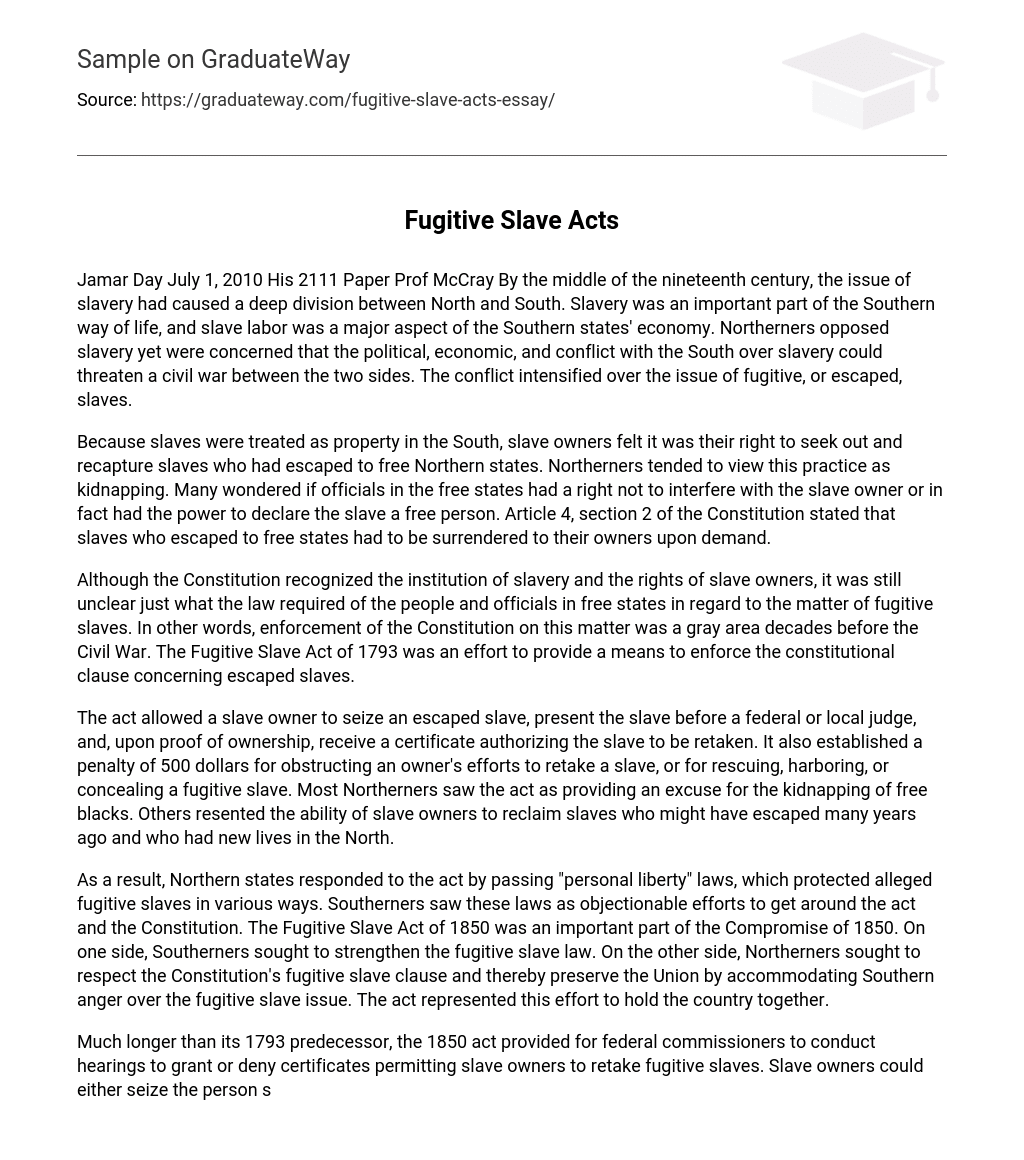During the 1850s, a major divide emerged between the North and South in regards to slavery. Slavery had deep roots within Southern culture and played a crucial part in the economy of Southern states. While Northerners were against slavery, they also feared that conflicts related to it could result in a destructive civil war with the South. One significant area of disagreement was the treatment of escaped slaves seeking sanctuary.
Slaves were considered as property in the South, giving slave owners the belief that they had the right to find and reclaim escaped slaves in the free Northern states. Northerners saw this act as kidnapping and questioned whether the free states had the authority to intervene or declare the slave as free. According to Article 4, section 2 of the Constitution, escaped slaves in free states had to be returned to their owners if requested.
The Constitution acknowledged slavery and the rights of slave owners. However, there was uncertainty about what exactly the law demanded from individuals and officials in states where slavery was not allowed, when it came to fugitive slaves. Essentially, the enforcement of the Constitution regarding this issue was ambiguous long before the Civil War. The Fugitive Slave Act of 1793 aimed to establish a method for upholding the constitutional provision regarding escaped slaves.
The act permitted slave owners to capture escaped slaves, bring them before a federal or local judge, and, with evidence of ownership, obtain a certificate that authorized the reclamation of the slave. It also imposed a fine of 500 dollars for impeding an owner’s attempts to recover a slave or for aiding, sheltering, or hiding a runaway slave. Many Northerners viewed the act as enabling the abduction of emancipated blacks, while some objected to the power of slave owners to reclaim long-escaped slaves living new lives in the North.
As a result, Northern states responded to the act by passing “personal liberty” laws, which provided protection for alleged runaway slaves in different ways. These laws were seen by Southerners as objectionable attempts to circumvent the act and the Constitution. The Fugitive Slave Act of 1850 was a significant component of the Compromise of 1850, where Southerners aimed to strengthen the fugitive slave law, while Northerners aimed to uphold the Constitution’s fugitive slave clause and thus maintain the Union by accommodating Southern anger towards the issue of fugitive slaves. The act exemplified this effort to maintain national cohesion.
Much longer than its 1793 predecessor, the 1850 act introduced federal commissioners to hold hearings in order to determine whether to grant or deny certificates that would allow slave owners to reclaim escaped slaves. Slave owners had the option to either apprehend the individual believed to be a fugitive slave or obtain a warrant to have a federal marshal arrest the suspected escapee, who would then be brought before a commissioner for a hearing. According to the act, the alleged fugitive was forbidden from testifying during the hearing, while commissioners were rewarded with double compensation for approving certificates compared to denying them.
The Federal marshals failed in their duty to execute warrants and allowed fugitives to escape. The penalties for obstructing slave owners or aiding fugitives were increased and included imprisonment. The people of the North viewed this act as much more intrusive than the act of 1793 and reacted swiftly. Many individuals resisted and disobeyed the law. A notable example is Frederick Wilkins, also known as Shadrach, a fugitive slave from Virginia who was rescued from a Boston courtroom and assisted in fleeing to Canada in 1851. In certain regions, it was difficult to find individuals willing to fulfill the responsibilities of commissioners under this act.
Despite evidence, individuals accused of violating the act were acquitted by juries. In June 1851, Harriet Beecher Stowe began publishing her influential anti-slavery novel, Uncle Tom’s Cabin, in weekly installments in the National Era magazine. The book gained popularity and bolstered Northern opposition to slavery. South Carolina’s secession from the Union in 1860 triggered a chain reaction of other states following suit, ultimately leading to the start of the Civil War in 1861. Three years later, in 1864, the Fugitive Slave Acts from both 1793 and 1850 were abolished. These acts represented an uneasy compromise between the North and South on the issue of slavery.
The Fugitive Slave Acts were offensive to Northerners who had opposed slavery. Southerners believed that some Northern abolitionists and lawmakers were promoting slave rebellions, which greatly concerned them. These acts were intended to preserve the Union but instead emphasized the divide on slavery. They also raised questions about following the rule of law and seeking justice within a Constitution that advocated freedom but also permitted slavery.
Works Cited
- Robert M. Justice Accused. New Haven, CT: Yale University Press, 1975.
- Fehrenbacher, Don E. Slavery, Law, and Politics. New York: Oxford University Press, 1981.
- Fehrenbacher, Don E. The Slaveholding Republic. New York: Oxford University Press, 2001.
- Finkelman, Paul. An Imperfect Union. Chapel Hill: University of North Carolina Press, 1981.
- Hall, Kermit L. The Law of American Slavery. New York: Garland Publishing, 1987.
- Wiecek, William M. The Sources of Antislavery Constitutionalism in America, 1760–1848. Ithaca, NY: Cornell University Press, 1977.





